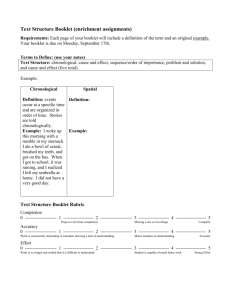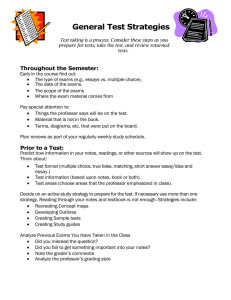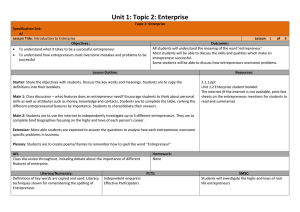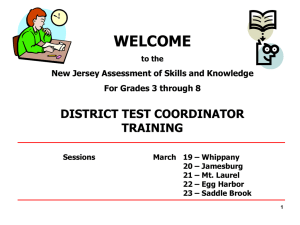Preparing Proctors 2015
advertisement
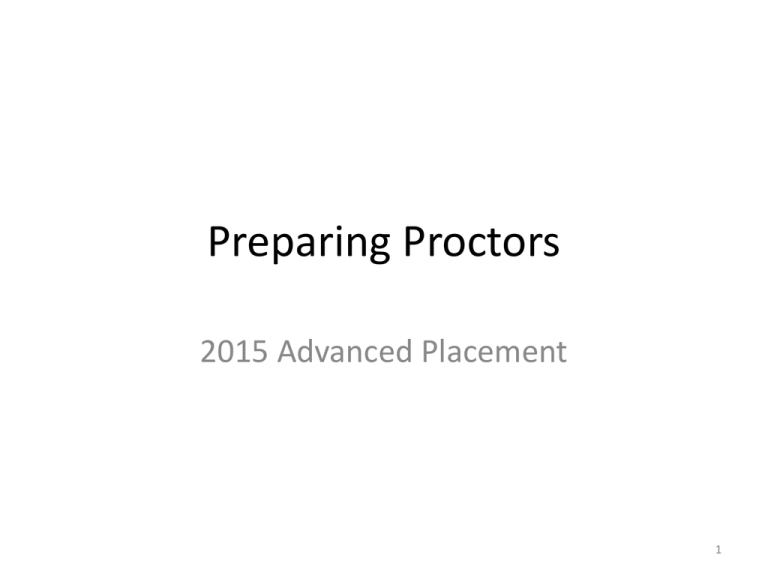
Preparing Proctors 2015 Advanced Placement 1 Who can proctor? • • • • Must be adults (no students) NOT in a subject area you teach/ have taught! Professionals, subs, or admin Retired teachers may serve in a subject area other than the one in which they have taught. 2 Proctor Schedule - review • Check your exam assignment and make sure you can make it and haven’t taught it • If you have to cancel/ get sick… • If you are proctoring an 8am test, report at 7:30 • If you are proctoring a noon test, report at 11:30 • Students have been asked to arrive by 7:45 for a prompt 8am start (and 12:00 for a 12:15 start). 3 Dress • Depending on the exam, you may be in there for over four hours. Please wear comfortable clothes and soft-soled shoes. It creates a disturbance if students can hear you walking up and down the rows. 4 Ratios Students Proctors 1-34 1 35-50 2 51-100 3 101-150 4 151-200 5 If you notice you’re in a testing situation without these ratios, please speak up! 5 Setting the Tone & Active Proctoring • No reading, eating, drinking, engaging in conversation, correcting papers or performing any other activity not related to the administration • Check that students are: working on appropriate section, using a pencil on MC, and using a calculator on approved sections/parts only 6 Bring: • • • • • • • • • • • • • Printed exam packets and any associated CDs, tapes, exams, equipment Answer sheets AP Student Packs – first test only The AP manual and 2014-15 AP Exam Instructions book All district School Codes (in case you’re testing a kid from another school) and homeschool code (990699) Pencil sharpener No 2 pencils Extra pens – blue or black only Extra lined paper Stapler Extra calculators Watch – but not a stopwatch. Each exam room should have 2 timepieces as a check against mistiming, and a clock should be visible to all students. If clock can’t be seen, time remaining should be posted at regular intervals Signs (see slide 13) 7 Overview: Duties PRIOR to administration • Familiarize yourself with administration and exam security in 2014-15 AP Coordinator’s Manual • Read all general and appropriate subjectspecific exam administration instructions to understand the flow of administration • Prepare exam rooms/ Set up exam equipment • Admit and assign seats to students • Check identification of students 8 Overview: Duties DURING administration • • • • • • • • • • • Bring all necessary materials to the exam room Check that students with disabilities have their SSD Letters to verify Ensure proper seating distance between students (5 feet shoulder to shoulder) Distribute testing materials Assist students with filling out their identification information on answer sheets Supervise testing room Supply pens, pencils, calculators when appropriate, and extra paper (as necessary). Walk around the room to ensure students are working on the correct exam section and are not using any unauthorized aids Guard against attempts at cheating Keep the room supervised at all times Complete a seating chart. A sample seating chart can be found on pages 118-119 of the AP Coordinator’s Manual 9 10 Overview: Duties AFTER administration • Collect and account for all exam materials (count them!) • Ensure students have properly identified their exam materials (with AP number labels, etc) • Dismiss students, making sure they do not take any exam materials from the room • Return exam materials to storage • Return seating chart to the AP Coordinator 11 Setting Up the Exam Room • Once you arrive: – Confirm the number of exam booklets for your subject and all necessary exam materials (CD’s etc) – Confirm the correct number of AP Student Packs and answer sheets – Confirm proper numbers of desks/ tables – spacing 6 feet apart? All facing same direction? – Check clock is working – Make sure no subject-related info on walls – Pencil sharpeners/ wastebaskets should be in rooms – Signs on door – “Exam in Progress” and “Cell phones are prohibited in the testing room” 12 Checking In • As students arrive, mark the roster • Make sure students sit in assigned seats, all facing same direction • Students should bring: – – – – – – – Several No 2 pencils Blue or black pens A watch Appropriate calculator School code Photo ID and AP Student Pack College Board SSD Accommodations Letter if taking an exam with accommodations 13 Student Packs • Every student has one. • A label is placed on every answer sheet, free-response booklet, and student-response CD that a student uses. • Students must not share their AP numbers • If a pack is lost or a student runs out of labels, your AP Coordinator has a full list of AP ID’s so you can write the ID instead. • Students must use the same AP number for all exams taken this year. The AP number identifies the student to the test. Missing numbers may result in the loss of materials. • Students will take their student pack with them at the end of their first exam. 14 Students must NOT bring: • Electronic equipment of any kind • Books, compasses, correction fluid, dictionaries, highlighters, notes, mechanical or colored pencils • Rulers or straightedges • Protractors • Scratch paper • Reference guides/ keyboard maps/ typing instructions • Computers • Calculators for any tests other than: Bio, Calc, Chem, Stats, Physics • Watches that beep or have an alarm • Portable listening or recording devices • Food or drink • Clothing with subject-related information 15 Schedule • Morning exams MUST start between 8 and 9 am, and that the afternoon exams MUST start between noon and 1 pm. • You may seat students and begin General Exam Instructions I or II prior to these official start times, but under no circumstances may the shrinkwrap of the actual AP Exam be opened prior to the start of these one-hour windows. – Students who begin taking the exam earlier than the official start time will have their scores canceled, and the schools may not be allowed to offer AP Exams in the future…) 16 General Instructions • All exam booklets are to be distributed individually. Hand one shrink-wrapped exam packet directly to each student in the order that they appear in the bundles or as individual exams. Students should not pass booklets to each other. • An 11-digit alphanumeric test book number is printed in the upper right-hand corner of both the multiple choice and free-response sections. Certain exams feature an additional Section II orange booklet; these also have serial numbers and must be returned to AP. • Answer sheet- use pencil only 17 Multiple-Choice Sections (MC) • Before exam begins, note the time. Note and post the start and stop time for each section after reading the relevant instructions. Do not write the start and stop times in advance of administration or you may affect the testing time. • No students may be admitted after the start of the exam unless unusual circumstances warrant it and the MC section has not been completed, and only then if this exception has been approved by me. • Within first half hour of the exam, make sure the # of students taking the exam plus the number of undistributed exam packets equals the number of packets you received. – If the numbers DON’T match – let students finish the section they’re working on; at end of section, stop the exam and locate the materials. If they can’t be located, contact me for further instructions before resuming 18 End of MC Section • Students are asked to seal the open sides of the exam booklets with white seals, provided. AP policy states that no one except the student may have access to the MC questions. Proctors may not open exam booklets. • Collect exams and answer sheets in same order they were distributed. • Check that each answer sheet has an AP number label and an AP Exam label applied. • After MC booklets and answer sheets have been collected, RECOUNT! 19 BREAK • 10 minutes between MC and Free Response (FR) • No phone calls, books, consulting teachers or other students about the exam. • No texting, emailing, or using phones or computers at all. • May have drink/snack. • Bathrooms should be checked during and after break. 20 Free Response Section • Second half of exam is Free Response essays, written or spoken. • May have an orange booklet with questions • Written responses must be written in the free-response booklet, not in the orange booklet. • If students require additional space, provide lined paper. – Print AP number, the title of the exam, and the question number at the top of each extra sheet of paper. – After exam, student stapes extra paper to page corresponding to that question. – Students are not permitted to keep extra paper provided. – DO NOT provide extra paper for drafts 21 Noting Essay Choices: European History and US History • These exams feature a sheet of labels with question choices shrinkwrapped with FR booklets. When students unseal, labels should be put aside on the students’ desks until completion of Section II. • At conclusion of FR section, students are instructed to apply the appropriate label on the front cover of their Section II booklet, indicating their essay choices 22 AFTER the Exam • Collect all materials. • Check front cover of each Section II booklet – look for AP number label in the box and noted essay choices if applicable. • Check “Important Identification Information” are on back cover, and that answers have been written in the freeresponse booklet, not in the orange booklet. • Count FR booklets and orange booklets • Count master CDs and student-response recordings • Be sure numbers match – check that you are not missing anything before dismissing students. • Except for emergencies, students may not leave the room early. 23 AFTER the Exam • Remind students they may only discuss the FR questions if the specific questions are released on College Board website 2 days after exam. • Make a final check of the testing room • All exam materials and supplies are to be collected and returned to me. • Account for all exam booklets, answer sheets, master CDs and student-response recordings. • Return a completed roster as well as Seating Chart or Incident Report if warranted. 24 FORMS • • • • • Seating Chart Incident Report AP Score Cancellation Calculator Release Policy AP Exam Question Ambiguity and Error Form • Nonstandard Administration Report (NAR) 25 Special Equipment • Music Theory, Spanish Language and Culture • Please see me for further details 26 Contact Information • INSERT YOUR CONTACT INFO HERE. 27 28


